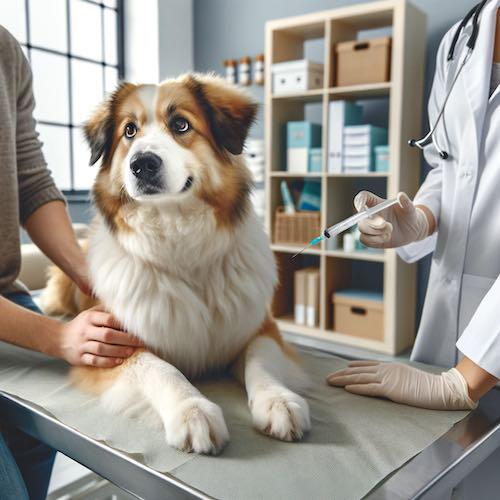Allergy Injections for Dogs: Costs, Benefits, and Side Effects
Introduction to Allergy Injections for Dogs
Allergies in dogs are not just a minor inconvenience; they can lead to chronic discomfort, distress, and even severe health problems if left untreated. Just like humans, dogs can be allergic to a wide range of substances, including environmental allergens like pollen, dust mites, and molds, as well as ingredients in their food. These allergies can manifest in various ways, often causing symptoms that significantly impair a dog’s well-being and happiness. Traditional treatments, such as antihistamines, steroids, or special diets, often provide only temporary relief, or come with side effects that can be detrimental in the long run.
Enter allergen-specific immunotherapy, or allergy injections, a treatment that addresses the root cause of the allergic reaction rather than just mitigating the symptoms. By gradually introducing small amounts of the allergen into the dog’s system, this therapy aims to retrain the immune system to tolerate the allergen, thereby reducing or even eliminating allergic reactions.
Though the process requires patience and commitment, the potential to fundamentally improve a dog’s quality of life makes it a compelling option for many pet owners. In exploring the intricacies of allergy injections for dogs, including the costs, benefits, and potential side effects, this article aims to provide a comprehensive guide for pet owners considering this treatment for their furry companions.
Price: $29.97 ($29.97 / Ounce)
1 used & new available from $29.97 ($29.97 / Ounce)
Understanding Allergy Injections for Dogs
Allergy injections, also known as allergen-specific immunotherapy, function by gradually exposing a dog to minute amounts of the allergens that trigger their reactions. This methodical process aims to enhance the dog’s immune system tolerance over time. It commences with a meticulous identification phase, where veterinarians conduct skin or blood tests to pinpoint the exact allergens affecting the dog. These could range from common environmental triggers like pollen, dust mites, and mold spores, to more specific irritants such as certain food proteins.
Following the identification of these allergens, a tailor-made serum is crafted specifically for the dog’s unique allergy profile. This bespoke approach ensures that the treatment directly addresses the individual sensitivities of the dog, potentially increasing the efficacy of the therapy. The serum is then administered via injections at regular intervals over a period that can span several months to years, depending on the dog’s response to the treatment.
This progressive exposure strategy is designed not just to alleviate the immediate symptoms of allergies but to initiate a long-term adaptation by the dog’s immune system. The goal is to reach a point where the dog becomes significantly less reactive or even unresponsive to the allergens that once caused them distress. By targeting the underlying cause of the allergic reactions, allergy injections offer a promising avenue for substantially improving the quality of life for dogs suffering from chronic allergies, providing a more permanent solution compared to conventional symptom management strategies.
Read More: Top 10 Best Dog Food Brands
Costs of Allergy Injections
The expense associated with allergy injections for dogs encompasses a broad spectrum, influenced by various elements such as the region where the treatment is provided, the particular allergens triggering the reactions, and the overall length of the immunotherapy program. Initial expenditures are typically tied to the diagnostic phase—identifying the allergens through detailed skin or blood testing—and the formulation of a specialized allergen serum tailored to the dog’s specific sensitivities. This initial stage is crucial for crafting a targeted treatment plan.
Following the creation of this custom serum, the treatment phase begins, entailing ongoing costs related to the administration of the injections. These expenses are not static; they evolve over the course of treatment, generally decreasing as the need for frequent injections lessens with the dog’s improving tolerance to the allergens.
An often-overlooked aspect of the financial investment in allergen-specific immunotherapy is the necessity for regular veterinary consultations. These check-ups are essential for assessing the dog’s response to treatment, adjusting dosages as needed, and ensuring the overall health and safety of the animal throughout the process.
Financially, the first year of allergy injection therapy can be the most demanding, with costs ranging between $500 and $1,200, reflecting both the intensive initial phase of treatment and the establishment of a routine care schedule. However, as the treatment progresses into subsequent years and the frequency of injections decreases, owners can expect a notable reduction in costs. This long-term investment in a dog’s health can significantly enhance their quality of life, making the upfront and ongoing expenses a worthwhile consideration for many pet owners seeking a more definitive solution to their dog’s allergy challenges.
Find: Best Dog Allergy Relief Tablets
Benefits of Allergy Injections
Allergy injections, or allergen-specific immunotherapy, present a multitude of advantages for canines grappling with the discomfort of allergies, transcending the temporary solutions offered by conventional medications. Beyond providing potential long-term relief by targeting the underlying causes of allergic reactions, this treatment modality carries the benefit of diminishing the dog’s reliance on pharmaceuticals to control symptoms. This reduction in medication use is not merely a matter of convenience; it critically lowers the likelihood of adverse effects that can arise from prolonged drug administration, such as liver damage or gastrointestinal issues, thereby safeguarding the dog’s overall health.
the improvement in quality of life for dogs undergoing allergy injections cannot be overstated. The alleviation of chronic symptoms like itching, skin irritation, and respiratory discomfort enables affected dogs to engage more fully in daily activities. They can return to their playful, energetic selves, participate more in family life, and enjoy outdoor activities without the constant burden of allergic discomfort. This enhancement of well-being extends to the pet owners as well, who often experience a sense of relief and happiness seeing their beloved pets in better health and spirits.
Allergy injections can lead to a more nuanced understanding of a dog’s specific allergic triggers, allowing pet owners to make informed lifestyle and environmental adjustments to further reduce exposure to allergens. This comprehensive approach to managing allergies not only addresses the immediate symptoms but also contributes to a more sustainable, health-focused living environment for the dog. In essence, allergen-specific immunotherapy offers a holistic pathway to managing canine allergies, with benefits that resonate through every aspect of the dog’s life and well-being.
Potential Side Effects
Allergy injections, regarded as a safe and effective treatment for managing canine allergies, do carry a small risk of side effects. While the majority of dogs tolerate the treatment well, there are instances where side effects may manifest, particularly following the initial doses of the allergen serum. Commonly observed reactions include:
Injection Site Reactions: It’s not uncommon for dogs to experience localized reactions at the site of the injection, which may present as redness, swelling, or a noticeable discomfort. While these reactions are generally mild and temporary, they indicate the body’s immediate response to the introduced allergen.
Allergic Reactions: Although rare, there is a potential for dogs to exhibit allergic reactions to the allergens contained in the injections. The severity of these reactions can vary widely, from mild symptoms such as increased itchiness or minor respiratory distress, to more severe and potentially life-threatening conditions like anaphylaxis. Such reactions necessitate immediate veterinary attention.
Fatigue or Lethargy: Post-injection, some dogs might display signs of fatigue or lethargy. This response, often short-lived, reflects the dog’s immune system working to process and adapt to the allergens introduced through the injections.
In addition to these side effects, there may be other, less common reactions such as gastrointestinal upset, including nausea or diarrhea, as the body adjusts to the treatment. It’s also worth noting that the frequency and intensity of these side effects can diminish over time as the dog’s body becomes more accustomed to the allergen exposure through ongoing treatment.
Vigilant monitoring by pet owners and regular follow-ups with a veterinarian are crucial to managing these potential side effects effectively. Adjustments to the treatment protocol, such as altering the allergen concentration or the interval between injections, can often mitigate side effects, ensuring the treatment remains both safe and beneficial for the dog. By maintaining open communication with a veterinary professional, dog owners can navigate these challenges to achieve a successful outcome from allergy injection therapy.
The Treatment Process
The treatment process for allergy injections, also known as allergen immunotherapy, is a structured approach aimed at desensitizing the dog’s immune system to specific allergens. This process typically unfolds across several stages.
Firstly, the identification of allergens is crucial. This often involves allergy testing, which can include skin prick tests or blood tests, to pinpoint the substances triggering the dog’s allergic reactions. Once identified, these allergens are formulated into a serum for administration.
The next stage involves the gradual introduction of the allergen serum to the dog’s immune system. Initially, the injections are more frequent, usually administered weekly. The dosage is carefully controlled and gradually increased over time to build up the dog’s tolerance to the allergens. The frequency of injections may vary depending on the individual dog’s response to treatment and the specific allergens involved.
As the dog progresses through the treatment, they enter the maintenance phase. During this stage, the frequency of injections typically decreases, often to a monthly schedule. The goal of maintenance therapy is to sustain the desensitization achieved during the initial phase and to provide long-term relief from allergy symptoms.
Price: $29.97 ($29.97 / Ounce)
1 used & new available from $29.97 ($29.97 / Ounce)
Conclusion
It’s essential for dog owners to understand that allergy injections require commitment and patience. While they offer the potential for significant long-term benefits, including reduced reliance on medications and improved quality of life for the dog, results may take time to become apparent. Additionally, regular follow-ups with the veterinarian are necessary to monitor progress, adjust treatment as needed, and address any concerns or side effects that may arise.
Allergy injections represent a valuable treatment option for managing canine allergies. By addressing the underlying cause of allergic reactions, they offer the potential for lasting relief and improved well-being for affected dogs. However, as with any medical intervention, it’s essential to consult with a qualified veterinarian to determine if this approach is suitable for your dog and to ensure that the treatment plan is tailored to their individual needs.


